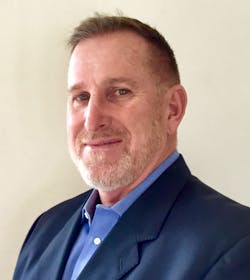FinditParts hires Ron Hendrixson as Chief People Officer
Every business, no matter the industry, needs a people person—not just to connect with clients and manufacturers, but to assist and support employees. FinditParts recently hired Ron Hendrixson as chief people officer (CPO). He was previously with Galiher & Hendrixson.
Hendrixson will serve as FinditParts’ point person for recruiting and talent growth, workplace culture, remote workforce efficiency, organizational development and structure, management support, and organizational strategy.
“Over the next several months, Ron will be organizing a powerful recruiting team, systems, and processes to accomplish the organizational growth we have planned moving forward,” said Robert Blatt, president of FinditParts.
Hendrixson sat down with Fleet Maintenance to discuss his new role, his approach to the position, and how he plans to face the industry’s current challenges within his sphere of influence.
Fleet Maintenance: What does a chief people officer do? That seems like a new term for head of HR. Does this signify how more emphasis is placed on hiring the right talent from C-suite perspective? Is this a change from when you began your career?
Hendrixson: Chief People Officer (CPO) moves the emphasis away from traditional HR and onto building and retaining a team. A CPO is focused on building the company with exceptional talent and then structuring and empowering this fantastic team to accomplish the business plan of the company.
The key elements of a CPO, in order of priority, are tuned to the organizational needs of our company:
- Talent acquisition
- Organizational development and management support
- Organizational strategy and structure development
- Remote team culture development and individual productivity
- HR administration
In this model, HR is an administration of payroll, benefits, policy, and operational standards.
FM: The transportation industry has a parts shortage and labor shortage. You decided to become responsible for finding people for a parts company. Why did you accept this challenge and what makes you suited for the job?
Hendrixson:I accepted this challenge based upon the exceptional opportunity I see in the commercial truck parts industry; the incorporation of automation and e-commerce in this supply chain is just beginning, providing us the opportunity for success. The difficulty in recruiting doesn’t concern me. I have been recruiting in difficult environments my entire career. I was an executive recruiter in the early days of the internet and was the first to specialize in technology at Korn/Ferry International in 1995 in Los Angeles. At that time, most executives we recruited for technology companies or startups were from other industries.That theme in my career continues today—I take on difficult recruiting challenges and find a way to succeed. I remember recruiting an executive for Apple in 2000 when Steve Jobs had just returned. There were under 5,000 employees, the stock was $11 a share, and most of the world thought Apple had gone out of business. That was a tough sell; looking back, it’s hard to imagine Apple ever being that small.
FM: What type of characteristics make a good parts support expert? What will you be looking for?
Hendrixson: There are many important roles at FinditParts.com. The focus for parts experts will be having a deep knowledge of truck parts, being a flexible thinker and problem solver, and having natural customer service skills. Parts identification is particularly complex in many truck repair scenarios; therefore, we need excellent customer support professionals.
FM: What are some methods, from soft skills (interviewing strategy) to software, you will use to find the best candidates?
Hendrixson: Finding the best candidates starts long before the interviewing process. We develop ecosystems of candidate pools that contain exceptional candidates for our open roles; then we identify likely candidates from those pools, engage them in our journey, and then compare several of the best possible candidates during the interview process.
From the moment we have a great slate of potential candidates, we use a team approach to attract each candidate into the conversation and assess the talent, skills, and fit for each potential interviewee. This will involve the hiring manager, the people team, and most likely Robert Blatt, our president.
FM: Any advice for fleets and shops on how they can use the right questions and technology to find good people?
Hendrixson: Questions and technology are important and necessary components of the recruiting process, but they don’t make the difference. It’s about developing the judgment of the talent acquisition team to understand the role and develop a unique strategy for each search.
FM: Are you going to be competing with FindItParts customers for good people? A skilled parts expert who knows how to get things seems like a valuable commodity nowadays. Is this a good role for people about to retire, or are you looking for younger, tech-savvy people you can train up on parts knowledge and let the platform AI do the heavy lifting?
Hendrixson: I am sure we will be competing in the talent marketplace for the very best people; however, we will not be recruiting from our customers or inhibiting their ability to succeed. We feel that we are part of an important section of the transportation network of the United States and will be supporting all of the other companies in this network. More importantly, we are taking a fresh approach to provide the parts necessary to keep commercial trucks on the road, and many of our employees will be from e-commerce or other tech companies as well as those in the parts supply chain.
FM: Anything else? What’s something our readers would find interesting about your career or life?
Hendrixson: Andy Knox, my first mentor in the executive search business, advised me to save at least half of everything I earned, since the search business drops hard when we have any recession. My solution to the cyclical nature of the business is to save 75% of what I earn each year, and when the downturn hits, I take off on an adventure. And with modern technology, I can stay in touch and manage the low-level search work from my boat. It is a great way to refresh and have some fun.
After I resigned from Apple, my first big trip was to sail from Los Angeles down the western coast of Mexico and Central America and through the Panama Canal to explore the Caribbean. As business picked up, I returned to the U.S. and back to work. The second trip was more significant; I departed LA in 2010, sailing west to Hawaii, Samoa, Tonga, and Fiji. While in Fiji, I received an email from Dan Walker and Ron Johnson (both formerly Apple executives). I was commanded to return to help turn around JCPenney. I parked the boat in New Zealand and flew back to work again.
Two years later, I camped for six months around New Zealand and then got back on the boat to sail from New Zealand to Australia; the Tasman Sea lived up to its dangerous reputation. Then it was on to Indonesia, where I visited dozens of remote islands, Thailand, Singapore, and several other Asian island nations before I hopped the Indian Ocean to the Mediterranean. This portion of the trip lasted from 2013 to 2021 and was my last summer sailing the Mediterranean.
The sailing adventure of over 10 years is over. I sold the boat and engaged in our ranch in Utah, where we grow organic grass hay, raise grass-fed beef, breed and ride horses, have chickens for eggs, barn cats, etc.; the whole remote ranch life. We also do a lot of mountain biking in the summer and snowboarding in the winter. I would add that paragliding is excellent in Utah as well; this is one of my new sports.


